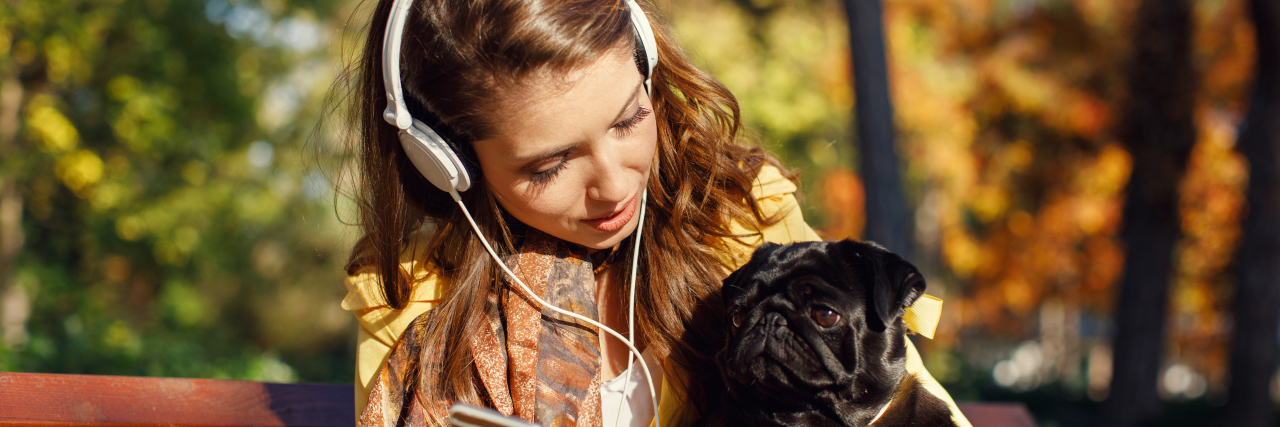Best-Selling Author Glennon Doyle Debuts Mental Health Podcast
Editor's Note
If you live with an eating disorder, the following post could be potentially triggering. You can contact the Crisis Text Line by texting “NEDA” to 741741.
If you have read Glennon Doyle’s brilliant memoir “Untamed” that took the world by storm, you’ll be happy to hear she has come out with a podcast. If you are not familiar, Glennon Doyle is a New York Times best-selling author who has also written “Love Warrior” and “Carry On, Warrior: The Power of Embracing Your Messy, Beautiful Life.” Doyle shares her journey from alcohol addiction and bulimia, to falling in love with a woman while in a marriage with a man. The author chronicles her transformation to a sober life filled with coping mechanisms for anxiety and the many boundaries she sets to navigate her troubles that would formerly be drowned in intoxication.
The podcast is fittingly titled “We Can Do Hard Things,” a famous one-liner that has become a motto for the author, and subsequently for many readers of her book. Doyle is joined by her sister, Amanda, who she lovingly calls “sister” throughout the show, to discuss topics of mental health. So far, she has two episodes — one covering anxiety and the other about boundaries.
The second episode gave me the epiphany about something I have been trying to figure out for some time — why I have so much trouble being in social situations and my difficulties dealing with the general public. I knew that certainly my own anxiety had something to do with this, but that it is more specifically because this anxiety makes me experience everything everyone else in the room is experiencing in addition to my own experience.
An example she uses is being in a room for free breakfast at a hotel pre-COVID-19.
This situation presented a crying baby with a desperate mom accompanying the baby’s unsupportive father, a couple arguing and a little girl trying to get cereal without any assistance. People with anxiety generally have a tendency for great empathy and so Doyle has trouble ignoring all of these visible issues that were external to her own life. Her wife, who was with her, does not have the level of anxiety that Doyle does and was able to get her breakfast without a problem, while Doyle walked out with a single roll in her hand. Doyle became so distracted with people who had nothing to do with her.
I hope I haven’t spoiled the podcast too much, but this episode made me realize that I find myself being more affected by other peoples’ lives than I should be. At work or in any public setting, I will ask myself why someone is talking so loud, why someone would wear such an outfit or just generally why people operate the way they do. After years of putting my energy toward everyone else’s decisions instead of my own, I have put all of this added stress on myself that has only made my own experience in life more difficult.
The word Amanda uses in talking about having boundaries for monitoring the lives of others is responsibility. We are only responsible for the way we carry ourselves in this world; we are not responsible for the actions of others. This is something I have to remind myself of every day when perhaps someone is wearing a mask incorrectly or driving way too fast or slow around me — that everyone else is going to do what they want to do because it is their own life, and to be OK with that. I realize it is my first instinct to nitpick what other people do and think about how I would do things differently, but this extra labor does not serve me. It is not needed or useful for anything. It only makes my blood pressure go up and add on irrelevant frustration.
I have begun to catch myself in this thinking and save myself mental real estate for more constructive thoughts. Changing thought patterns has been a journey for me just because of the volume of thoughts that run in and out of my head every day. It is a labor of self-improvement to choose how I choose to handle external factors in every given situation. I can now see how I have avoided social situations by hiding in my room instead of hanging out with friends, and choosing early morning shifts that begin hours before the store opens to customers. I have confined myself to a janky sleep schedule because it is my way of bypassing laborious social monitoring of others.
I hope that if you are an anxious person who also gets sidetracked easily by things outside of your control, that this perspective can help you to cut down on the emotional weight that comes with social settings. This podcast is a reassuring reminder of many helpful themes that re-entered my mind after reading “Untamed” a year ago. Every Tuesday, I can look forward to another meditation on ways of being as I can hear Doyle saying. I am so thankful for these introspective sisters and I cannot wait for more wisdom and candid conversation in future episodes.
Photo credit: djiledesign/Getty Images

